
Orwell’s Influence has continued in the decades since his death. From 1983
The Enduring Legacy of 1984
Now I turn my attention to the prophetic English writer George Orwell, born Eric Arthur Blair, who died shortly after his terrifying classic 1984 was published almost seventy years ago.
This is my latest installment in an ongoing series on the lives and astrology of exemplary individuals of our era. So far this has included Eleanor Roosevelt, Rachel Carson, and, from another era, William Blake. This series will continue through this year and maybe beyond.
In January of this year, 2017, Orwell’s novel 1984 jumped to the head of best-seller lists coincident with the inauguration of the current US President. Currently there’s a theatrical adaptation playing on Broadway. 1984 had been considered prophetic in its depiction of an extreme “surveillance state”. Most recently, in this time of “alternative facts” and “fake media”, we are struck by Orwell’s depiction of language perverted and our shared sense of reality diminished.
The adjective “Orwellian”, referring to just about anything to do with his great last novel, is frequently used in political commentary, but, unlike the word “Jeffersonian”, is never used in a positive way but to depict repressive authoritarian rule and the mistruths and propaganda that go along with it. Last week, watching a morning news segment, there was a (democratic) legislator quoting “War is Peace/Freedom is Slavery/Ignorance is Strength” from 1984.The expression “Orwellian nightmare” has been used too often lately for my comfort.
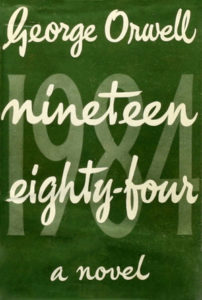 Writing after World War Two and as the Cold War was gathering, Orwell’s interest was in exposing how totalitarianism happens and what supports its development. Aside from the well-known 1984 and his best-selling Animal Farm of a few years previously, Orwell wrote important full-length books and essays that are too often neglected. They are also works of ideas.
Writing after World War Two and as the Cold War was gathering, Orwell’s interest was in exposing how totalitarianism happens and what supports its development. Aside from the well-known 1984 and his best-selling Animal Farm of a few years previously, Orwell wrote important full-length books and essays that are too often neglected. They are also works of ideas.
Does any of this make Orwell “exemplary”, one whose life can be a model for others? There was nothing saint-like about this man yet his contribution to our culture is clear. He was not able to leave the world a better place than he found it, but instead told us how the world could become far worse. What of his positive personal qualities? Many will be apparent you read about his life. It’s a remarkable event-filled life, worth examining and learning from.
Our Lives are Boring Compared with His
Eric Arthur Blair was born in India in 1903 but raised in England in a “lower upper middle class” family. As a youngster, he attended private schools on scholarship and quickly learned to loathe upper-class snobbery, to be sensitive to class distinctions pervading his society. (He later wrote a book about his early school experiences that was not published during his lifetime, fearing charges of libel.) As a teenager Eric Blair als0 discovered the beauty of words and began to think of himself as a literary person.
Unable to afford or qualify for university education, in 1922 Blair took a job as a policeman in Burma, then a British colony. This was his turn to be the oppressor. It was an experience he hated; he began to see colonialism not as a “white man’s burden” but as heartless naked exploitation. Later he would write compassionately of an officer having to shoot an elephant to save face with the local people, and how one man, being led to his execution, carefully stepped aside a puddle on his way to die. Orwell’s sympathetic viewpoint combined with an eye for illustrative detail that characterizes much of his later work. He left Burma a few years later vowing to devote his life to being a writer.
Orwell’s next adventure had a different level of difficulty – he went into the slums of Paris and lived as a homeless person, eventually finding work as a dishwasher. Later he 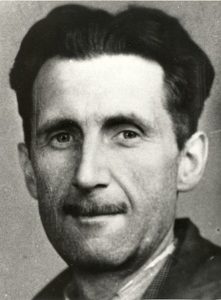 did the same thing in London. He recorded the squalid conditions of those subject to this kind of life but also their humanity and resilience – without sentimentality. His experiences prompted him to write the heartbreaking essay “How the Poor Die.” He depicted his observations in the longer Down and Out in Paris and London (1933) that was received well critically commercially. At that time he changed his pen-name to “George Orwell”, named after a river nearby and the current King of England.
did the same thing in London. He recorded the squalid conditions of those subject to this kind of life but also their humanity and resilience – without sentimentality. His experiences prompted him to write the heartbreaking essay “How the Poor Die.” He depicted his observations in the longer Down and Out in Paris and London (1933) that was received well critically commercially. At that time he changed his pen-name to “George Orwell”, named after a river nearby and the current King of England.
Two years later he met Eileen O’Shaughnessy, an intelligent literary woman who was not too bothered by Orwell’s eccentric lifestyle and impoverished means. They would have a happy and productive marriage for the following nine years.
In 1936 Orwell was commissioned to write about the conditions of people in the mining towns of northern England. Again he lived a life of voluntary poverty as he surveyed this desolate area and its people struggling to get by. In The Road to Wigan Pier (1937), Orwell wrote eloquently of class culture although he was strongly aware of his relatively privileged status and even his own snobbishness. He became interested in socialism and reducing the oppressive economic and political power of his country’s upper classes.
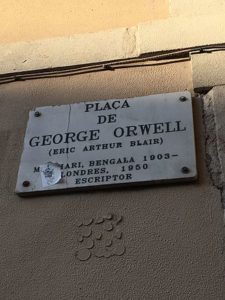
A plaque where he and his wife resided in Barcelona during the Spanish Civil War in the late 1930’s.
His next destination was Spain where he joined the Spanish Civil War. This was between the forces of fascist leader Franco against a coalition of leftist factions — communists, socialists, anarchists. Many left-leaning people around the world traveled to in Spain to participate. Although bothered by a recurring lung condition, Orwell spent four months in the battlefield until he was wounded in the throat. Generalissimo Franco was helped by the Germany and Italy; left-wing groups on the other side divided between the communists, who were allied with a Stalinist authoritarianism, and the more idealistic socialists. Franco prevailed and became Spain’s dictator for decades following. Orwell and his wife barely escaped Spain. His experiences inspired his critique of left-wing and right-wing political enterprises.
Orwell grappled with the conflict between his socialist desires for his society’s transformation and the emerging outside threat from Hitler. He wrote essays such as “The Lion and the Unicorn: Socialism and the English Genius”, arguing for a patriotic brand of socialism. Ill health (advanced tuberculosis of the left lung) required a drier climate and Orwell and his wife went to Morocco, but world events soon brought him back to England.
Orwell badly wanted to join the military effort against Hitler but was refused enlistment because of ill health. Instead he moved to London – just in time for the blitz — and he worked in the local militia helping to clean up after nightly bombing raids.
In 1941 Orwell got regular work – for the BBC’s “Empire Service” that produced English-friendly broadcasts to India to strengthen the war effort. Orwell’s writing and that of others were checked by censors in the Ministry of Information. Orwell got an education in the use and disuse of language for propaganda purposes and the labyrinths of governmental bureaucracy. He quit this job a few years later because he found the work there to be useless. Instead he wrote essays and newspaper columns as his contribution to the war effort.
During this period he began work on what was to become Animal Farm, conveying his alarm at his country’s wartime alliance with Stalin’s Soviet Union. In this extended allegory, the farm animals overthrow an oppressive and negligent farmer and the proletarian leadership becomes increasingly repressive and even physically resemble their previous oppressors. Animal Farm was delayed in its publication, out of fear of its transparent critique of Britain’s ally. Published shortly after the war ended, Animal Farm made Orwell an internationally-known writer.
In 1944 George and Eileen adopted a boy. In the following year, with allied victory at hand, Orwell traveled to France to find a vengeful society now freed from the Germans, and to Germany where he found what today we would call a “humanitarian catastrophe”. During this trip Orwell found out that his wife died during an operation in England. Orwell returned to England.
During these difficult times and with increasingly fragile health, Orwell sent his son to relatives and began writing 1984, a task he found difficult. He wrote and re-wrote his book as his health continued to fail but in late 1948 he declared the book finished.
1984 was published in June 1949 to instant critical and commercial success. Although his health continued to weaken, he became engaged marry once again and his wedding was conducted bedside. Orwell died on January 21, 1949 at the age of forty-six.
Remarkable Life, Remarkable Chart
Orwell’s chart is striking in many ways. Usually I refrain from jumping quickly to the Sun and Moon signs but in Orwell’s case this is where we start.
Sun and Moon
It would catch the eye of anybody first looking at this chart – Sun conjunct Moon conjunct Neptune closely in Cancer in the Eleventh House. There are many ways to take apart this configuration to render important information.
In line with much modern astrology, we can begin with the sign Cancer as a personality type. We’ve read about Cancer’s familial attitudes, its informality and its ability to make emotional connections and allow people to feel comfortable and taken care of – and perhaps suffocated. Orwell wasn’t exactly a “maternal” kind of guy yet he did possess an emotionally caring character.
We can also look at Orwell’s streak of small-town nostalgia. Although Orwell promoted a radical change in society to reduce class differences he clung onto a traditional English way of life. He knew all about his snobbish side and approached it honestly and openly. We can also factor in his personal and national loyalty regardless of his many criticisms of his country’s colonialist and class-focused ways.
One reputation possessed by men with “strong Cancer” is moodiness, an absorption in and sullen display of one’s momentary emotional changes. I do not know enough about Orwell up close to determine if this was the case for him, but it seems likely.
A more traditional way to approach the Sun and Moon conjunct in Cancer is through the hegemony of the Moon over the Sun, since Cancer is governed by the Moon. This gives us more information.
He get another look at his aversion toward all forms of oppression, especially his distrust of solar leadership where a charismatic person establishes a “cult of personality” around him. You may recall Animal Farm’s depiction of how revolutionary leadership becomes poisoned by thirst for power and dominance, so that the farm’s original oppressive conditions are restored. In 1984, during Winston Smith’s “enhanced interrogation”, O’Brien talks about the dictatorship’s desire for power for its own sake, that in previous dictatorships idealistic tendencies have been sullied their desire for power. We may also look at the lunar protective function, exercised by him on a national scale.
… with Neptune in the Eleventh House
There was nothing mystical or metaphysical about Orwell – he viewed all religions with equal distaste and was clearly allied with a British rational empirical point of view. We have noted his (ambivalent) sense of kinship with those who are underprivileged and those who suffer from government oppression, and throughout his life Orwell placed himself in their company. Neptune adds global compassion to his Cancerian emotional sensitivity.
We need to look at Orwell’s health problems, for he was never fit or in good health. Orwell’s physical vulnerability, a characteristic of Neptune in strong aspect to one or both luminaries, would be worsened by the austere conditions in which he lived for some of his life.
Nobody who has read Animal House or 1984, or Orwell’s other works, would consider its author to be to be a foggy optimist. He was too attuned to the suffering of others to be idealistic, yet the pessimism of his later works may tell us that he also thought he could make a difference. Indeed he has.
We usually think of the Eleventh House as about friendships, sometimes adding “hopes and wishes” as a weird relic from days gone by. However, the Hellenistic name for this place was the “Good Spirit” with Jupiter in its joy there, and medieval astrology picked this up. Opposite the Fifth House of “Good Fortune”, the Eleventh also was considered a place of fortune.
We can look at Orwell’s dream to be a writer in spite of early failures, discouraging feedback, and financial struggles. He took a job as a teacher in the early 1930’s and could have been content with this noble but secure profession. His ability to work strenuously to develop himself as a writer was buoyed by a faith that his desire for himself was also his destiny. This seems to correlate with his powerful Eleventh House, with a touch of Neptune.
We Arrive on Mercury
I consider the Ascendant degree the “seed syllable” of a natal chart. When beginning to work with a chart, I first explore its sign and aspects to the Ascendant degree, planets in the First House, and the ruler of the First House. Orwell was born at a New Moon; since the Lots of Fortune and Spirit are derived from the distance between the Sun and Moon, both are conjunct Orwell’s Ascendant in Virgo.
Virgo, the inward problem-oriented nocturnal sign governed by Mercury, is Orwell’s Ascendant and First House, denoting his physical appearance and the basic thrust of his energy. You can see by his picture that he was thin, compact and built for efficiency. Orwell had much physical endurance even with his lifelong lung (Mercury) problems, or he would not have adjusted to so many difficult environments during his adult life.
We now turn our attention to Mercury in its diurnal domicile Gemini, in the Tenth House from the Ascendant and the Lots of Fortune and Spirit.
Mercury is in Gemini, its diurnal domicile. Taking a closer look, Mercury is oriental (rising at dawn from the Sun) and is wholly in sect in Orwell’s diurnal chart. This adds to an already favorable environment for Mercury.
Mercury in its diurnal sign Gemini is given to quickness, adaptability, curiosity, playfulness, and verbal expressivity. Gemini helps account for the range of his experiences, the ability to place himself in different environments, and the ability to communicate significantly about his experiences.
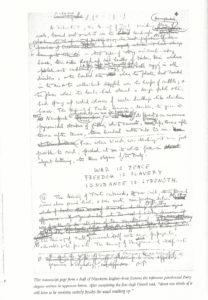
Here’s a famous page from his draft of 1984, clearly the fruit of much hard labor. This should comfort and encourage writers of all kinds.
Of the planets in aspect to Mercury’s we note trines from Saturn in Aquarius and from Mars in Libra. This three-planet configuration emphasizes Saturn: in a day chart Saturn is the triplicity ruler of these three planets. Saturn is also in its own (diurnal) sign and is additionally the exaltation lord of Mars in Libra. Orwell’s critique of language has a strongly Mercury-Saturn cast.
With Virgo rising and a strong Mercury configured by Saturn we might think of one who looked at language critically. We can look at the clarity of his prose even when the concepts conveyed were complex and he advocated a simplicity and directness of style that served him well. Like many writers and artists of all kinds, the naturalness of the final product hid the hard work it took to bring it into existence.
Orwell’s Contribution to Language and Political Life
We see most clearly Orwell’s Mercury and Saturn when we look at his essay “Politics and the English Language” written in 1946. He follows the modern tradition of advocating a simpler prose style – reduce pretentious diction and vocabulary, dying metaphors, meaningless or foreign-derived jargon when something simpler would do. He also dismisses words derived from Greek or Latin when those derived from Anglo-Saxon-derived would do. In my view Mercury-Saturn is here leaning toward the priggish.
Early in “Politics and the English Language” Orwell tells us that “[The English language] becomes ugly and inaccurate because our thoughts are foolish, but the slovenliness of our language makes it easier for us to have foolish thoughts.” He sensitizes the reader to language that fills space, deadens thinking, substitutes blather for conveying information and ideas. One may single out today’s political discourse and any fifteen minutes of cable news networks will provide you with enough dead metaphors (e.g. “twisting in the wind”) and useless phrases (e.g. “at the end of the day”). Orwell’s essay should be read by politicians and all those in the broadcast media.
In 1984 Orwell gave us fictional representations of the process of debasing language and thought, termed Newspeak and Doublethink respectively.
“Newspeak”, the new way of talking being introduced that aims to reduce deviant thinking by making its words and concepts impossible. From the inquisitor O’Brien to the hero of the novel, Winston Smith:
Don’t you see that the whole aim of Newspeak is to narrow the range of thought? In the end we shall make thought-crime literally impossible, because there will be no

Richard Burton in the role of O’Brien in the 1984 film 1984
words in which to express it. Every concept that can ever be needed will be expressed by exactly one word, with its meaning rigidly defined and all its subsidiary meanings rubbed out and forgotten. . . . The process will still be continuing long after you and I are dead. Every year fewer and fewer words, and the range of consciousness always a little smaller. Even now, of course, there’s no reason or excuse for committing thought-crime. It’s merely a question of self-discipline, reality-control. But in the end there won’t be any need even for that. . . . Has it ever occurred to you, Winston, that by the year 2050, at the very latest, not a single human being will be alive who could understand such a conversation as we are having now?”
Orwell’s concept of “Doublethink” debunks the usual notion that holding two opposite facts in one’s mind at the same time results in cognitive dissonance and that, if unable to leave the field, we escape into psychosis. Instead this tendency has become, to use another currently-overworked expression, “the new normal”.
To know and not to know, to be conscious of complete truthfulness while telling carefully constructed lies, to hold simultaneously two opinions which cancelled out, knowing them to be contradictory and believing in both of them, to use logic against logic, to repudiate morality while laying claim to it, to believe that democracy was impossible and that the party was the guardian of democracy, to forget whatever it was necessary to forget, then to draw it back into memory again at the moment when it was needed, and then promptly to forget it again, and above all, to apply the same process to the process itself—that was the ultimate subtlety: consciously to induce unconsciousness, and then, once again, to become unconscious of the act of hypnosis you had just performed.
In my view the relationship between language and thought more complex than Orwell renders it, yet the power of his ideas is obvious and they are sadly relevant today.
Jupiter in its Nocturnal Attire
If Mercury governs the diurnal sign Virgo and nocturnal sign Gemini; Jupiter governs the diurnal sign Sagittarius and the nocturnal sign Pisces. Many of the modern stereotypes for Jupiter pertain solely the stereotypes for Sagittarius – supposedly this planet’s influence makes one opinionated, ideological or philosophical, maybe religious or far-seeing. There is more to Jupiter than this, for Jupiter is the planet of inclusion into larger dimensions of life, culture, and world. George Orwell had Jupiter in Pisces in the Seventh House.
Jupiter’s nocturnal rulership of Pisces tells us more about Jupiter’s range of meanings. Pisces is a mutable and water sign that gives Jupiter empathy and a kind of intuition that is both flexible and beyond the personal (unlike Cancer). Pisces gives Jupiter a generous nature without the grandstanding that sometimes compromises Sagittarius. As a mutable sign, one may vacillate out of fear of causing hurt. Jupiter in Pisces is a quieter sign than Sagittarius, one that characterizes the secret benefactor more than the public hero.
Note that Jupiter gathers squares from both Uranus in the Fourth House and Pluto in the Tenth. Alongside his distrust of authority was his growing distrust of ideology because it quickly degenerates into power politics and authoritarianism. Every cause inevitably disappoints.
Let’s Go Modern
Orwell’s midpoints give us one striking configuration. if you look at his Midheaven degree you will notice that it is exactly between Pluto and the conjunction of Sun and Moon!
But first — what is the difference between the Midheaven and the Tenth House or sign? The Tenth represents one’s pubic work in the world, one’s “action”. The Midheaven degree is more about livelihood, a style of living that places you within the larger world.
This gives Orwell’s Pluto a dominating appearance that made him a tough-minded observer of society, a master of the dark but accurate prophecy. Orwell’s life-connection to the larger world was through the pathos, blind stupidity, and evil that he encountered throughout his travels in the twentieth century. Although both Animal Farm and 1984 are pessimistic and even terrifying, and were undoubtedly painful to write, today we benefit greatly from his dark labors.
When we look at Orwell’s chart containing only the “aspects of manifestation”, those of the opposition, square, semi-square, and sesqui-quadrate, we see more clearly the roles of Saturn and Venus.
Saturn bisects – is in semi-square to or forty-five degrees from – his Jupiter-Uranus square. Here Saturn acts as a cooling agent for an otherwise excitable and unrealistic planetary pair. We see his penchant for hard work but on his own terms, and an ability to look at soberly outcomes for the different change movements he encountered during his lifetime. This configuration reinforces the importance of his Saturn placement.
We have not yet discussed Orwell’s Venus in Leo in the Twelfth House. On the surface, this would be a source of great difficulty: the self-expressive nature and grandiosity of Leo have none of Cancer’s emotional sensitivity; planets in the Twelfth House can signify hidden difficulties that can be one’s undoing.
Let’s also consider that Venus closely configures Orwell’s Sun-Moon conjunction, being forty-five degrees or a semi-square away from both planets. We first talk of love.
Orwell could not have been an easy marriage partner. Regardless of his austere lifestyle and financial limitations, his desire to be in the middle of things, and his literary ambitions, he was in a very successful marriage until his wife’s death and was married for a second time four years later in a bedside ceremony shortly before he died. (For his successful marriage, we would also look at his dignified Jupiter in the Seventh.)
We also note Venus’ influence not only in his personal appeal and the quality of his prose: Orwell was able to bring to Mercury’s lucidity a Venusian artistic contribution. (Mercury is involved with this combination through aspects that divide the semi-square further).
Many of Orwell’s other harmonic charts provide further clarification. His Fifth Harmonic’s portrait of talent and situational creativity, discloses Orwell’s personal “true grit” – the combination of self-control and endurance – in the conjunction of Sun, Moon, and Saturn, all of which trine Mars closely. His unconventional marriage is indicated by this harmonic adding Venus to his Jupiter-Uranus square.
We turn our attention to important turning points in Orwell’s early life, his stint in Burma and the publication of his first successful work, Down and Out in Paris and London
Orwell joins the Indian Imperial Police

George Orwell’s passport photo for his stint for the Empire’s police in Burma
This must have begun as terrible news – Arthur Blair didn’t have the family funds or academic success to qualify for university education at Oxford and so he took the most unlikely of jobs, policing colonial Burma for the Empire. He discovered his homeland’s oppression at economic and cultural levels and developed a hatred for his nation’s colonialist ways. He emerged with a desire to be a writer by profession and a first glimpse of what to write about.
This job allowed the scope of Orwell’s life to move from the personal to the global, it awakened in him a sense of the much larger realities than his own life. This is signified by secondary progressed Jupiter stationing and turning retrograde then.
The Saturnine nature of the time is signified by Saturn transiting the the early degrees of Libra, going retrograde, stationing nearby, then passing direct onto his Sun, Moon, and Neptune combination. Blair considered himself a patriot during the First World War, fortunately being too young at that time to serve in the military. By 1922 and the beginning of his stint in Burma, disillusion had strongly set in.
Uranus at that time was transiting Pisces and would square Mercury. As difficult and depressing as the circumstances were, they engaged his eager intellect and gave him his ambivalently-radical outlook on the world. Neptune was in Leo at that time and in conjunction to his natal Venus – was there a lost love in the picture? Was going to Burma Orwell’s young attempt to join the British equivalent of the French Foreign Legion?
Orwell’s decennials were unremarkable – Venus/Moon in 1921 would last for two years. Of greater importance may be a complete planetary change to Mars-Mars in September 1924, a configuration that would drive him to give up on this job for which he was temperamentally and philosophically unsuited, to venture into a career writing.
Down and Out – Successfully
The publication of his Down and Out in Paris in London in 1933 was preceded by a progressed New Moon the previous year and by his progressed Sun in Cancer going into Leo. 1933 saw progressed Mercury, moving more quickly from its natal position in Gemini, also going into Leo. The two planets joined at the end of 1934, after the book’s positive critical reviews and commercial success had established his voice in his nation’s literary world.
This progressed Sun-Mercury conjunction also saw his pen-name to change from Eric Arthur Blair to George Orwell. I imagine that having a pen-name helps take one’s work out of the personal and made it easier to be a spokesperson for a set of realities different from his cultural background or personal expectations. And for Orwell it let his family off the hook.
 Orwell’s 1933 saw some important transits. Neptune in Virgo was coming into a square to natal Mercury in Gemini but transiting Jupiter was also in late Virgo, conjuncting his Ascendant degree and then, when moving into Libra, in aspect to his Sun-Moon-Neptune combination and then conjunct Mars. I’m not sure Neptune made his life any easier in the near term but Jupiter’s strong influence certainly took him out of obscurity even if not into great success. Orwell continued to live frugally by necessity until the successes of Animal Farm and 1984 after the Second World War.
Orwell’s 1933 saw some important transits. Neptune in Virgo was coming into a square to natal Mercury in Gemini but transiting Jupiter was also in late Virgo, conjuncting his Ascendant degree and then, when moving into Libra, in aspect to his Sun-Moon-Neptune combination and then conjunct Mars. I’m not sure Neptune made his life any easier in the near term but Jupiter’s strong influence certainly took him out of obscurity even if not into great success. Orwell continued to live frugally by necessity until the successes of Animal Farm and 1984 after the Second World War.
When he was preparing Down and Out, his decennials were Mars-Moon that would have increased his emotional responsiveness; at the beginning of 1933 they had changed to Mars-Sun, befitting well somebody who was to step into a public stage as a writer – and change his pen name.
How It Ended
Orwell had a Progressed New Moon in August 1947; a few months after he began writing 1984. By the end of 1947 he was dissatisfied with what he had done and began again, this time with better transits: Uranus in Gemini was crossing his Ascendant, opposing Jupiter and he was having Uranus opposite Uranus, an indicator of midlife. Jupiter that year was in Sagittarius, adding to the potency of this time. If his intellect was creative and brilliant his physical constitution was breaking down and he had to move from his home to receive medical attention on a continual basis.
By the end of 1948 Uranus had entered Cancer and – you guessed it – the outer planet of strangeness and genius would conjunct his Sun-Moon-Neptune configuration during most of the following year. He had completed his great novel, it was published and became a public sensation, and he was married to Sonia Brownell in October 1949 at his bedside. He was too ill to attend the wedding dinner with family and friends.
Orwell had entered a Jupiter-Jupiter decennial phase at the end of 1945, coinciding with the publication of Animal Farm. Jupiter-Mercury began in November 1946 and he was revising 1948 when they changed to Jupiter-Moon (we noticed a Moon sub-period when he was also working on Down and Out.) His greatest prominence occurred after the publication of 1984 and on January 18, 1950 he entered a Jupiter-Sun period.
Three days later, shortly before he was to leave to Switzerland for further care, Orwell suffered a massive hemorrhage of his lung and died the following day. Here’s a chart of
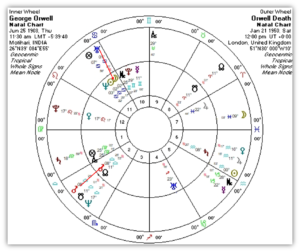
The Day George Orwell Died
his death, showing that Uranus has just passed –=once again – his Sun-Moon-Neptune but also that transitin

Orwell’s grave bears only his family name.
g Mars was exactly on his natal Mars. I supply his chart indicating these transits when he died.




Very good reading of a significant individual. Well done, too, in including relevant graphics. Let’s not overlook, however, that among the transits at the time of his death was Saturn in the first place: not good in addition to natal Saturn (domicile) in the sixth.
After a (somewhat haphazard) re-reading: There’s so much here, so many rabbit holes of investigation and rumination to follow.
I like using solar returns, and for 1949 — the year of greatest recognition, and his marriage and death: one might say the writing of his final work consumed him — it shows, as you wrote, Uranus conjunct natal Moon – Sun – Neptune. Also, solar return Mercury is exactly conjunct natal Mercury, with return Mars one degree away, and return Moon just three degrees further away: a most apt set of symbols for one whose writing was at that point reaching its greatest readership (in his lifetime, at least), but with unwelcome, hard-to-swallow news (the Mars factor).
Also of note, Neptune had for the previous couple of years been transiting back and forth over natal Mars: typically an energetically weakening and dissipating period.
At age forty-six, Orwell in the profection system was in an eleventh-place year, emphasizing once again the Moon-Sun-Neptune complex in all its ramifications.
As for his Sun – Jupiter period: How about the fact that he died just as Sun entered (detriment in) Aquarius, joining Jupiter (eleven degrees away, with natal Saturn at their midpoint) and Venus there? He didn’t have the strength left to explore romantic partnership — not even with Jupiter in domicile in the natal seventh place. As you point out, Jupiter turned retrograde by progression back at the time of his Burma stint. Even the great benefic leaves behind frustration and sorrow at the failure of great hopes, when he turns his back.
Jupiter in its Nocturnal Attire
If Mercury governs the diurnal sign Virgo and nocturnal sign Gemini;
I think that I am not wrong saying that a Mercury is diurnal in Gemini and nocturnal in Virgo.